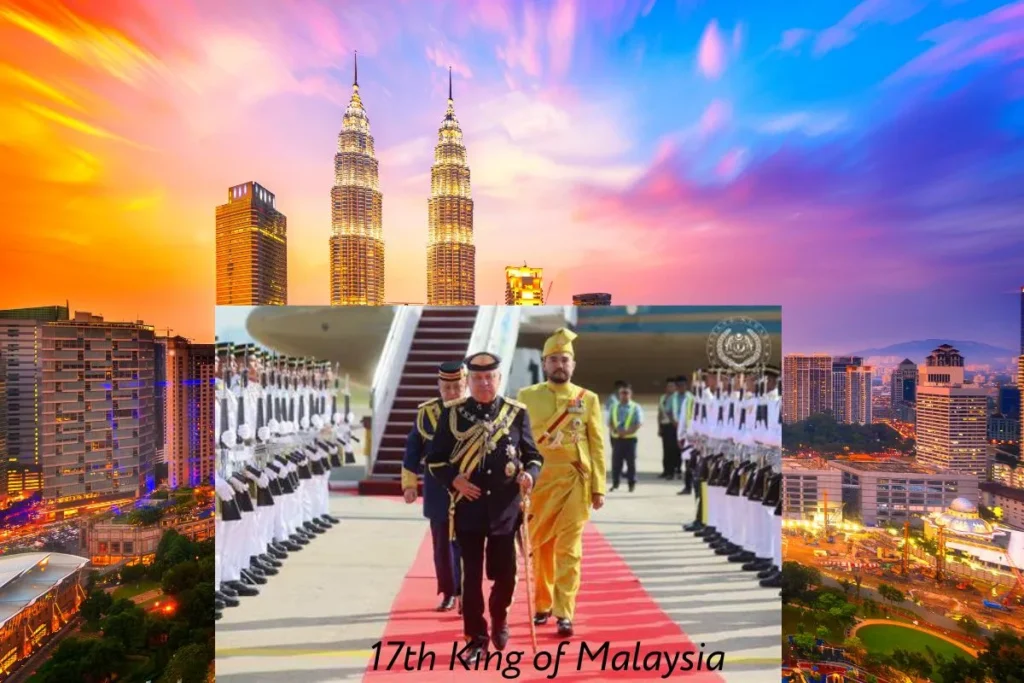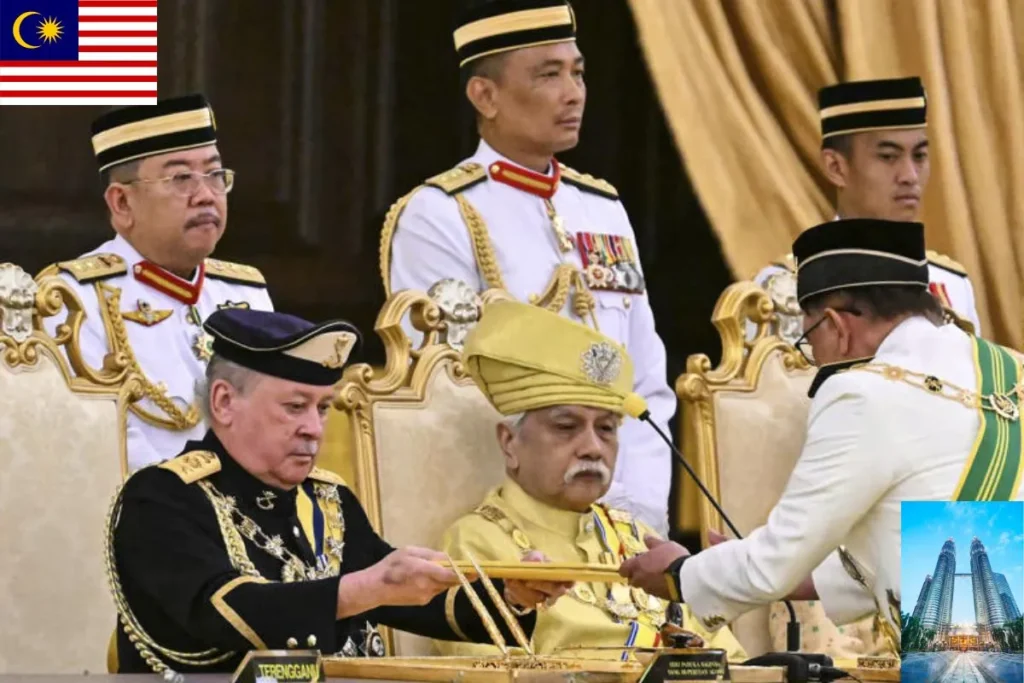Table of Contents
ToggleUnveiling the History of Malaysia and Malaysian Kings: Tuanku Abdul Rahman to Sultan Ibrahim
Malaysian King Sultan Ibrahim Sworn in as 17th King of Malaysia. Malaysia, a nation woven from diverse threads of ethnicity, culture, and history, boasts a unique monarchy system. Unlike the solitary reign of many monarchs, Malaysia’s throne rotates amongst the sultans of nine Malay states, creating a tapestry of leadership as rich and vibrant as the nation itself. Let us embark on a journey through this tapestry, exploring the monarchs who have graced the throne, from the first king to the recent ascension of Sultan Ibrahim Iskandar, the 17th Malaysian King.

From Earliest Kingdoms to Independence:
Our story begins long before the formation of modern Malaysia. Ancient Hindu-Buddhist kingdoms like Langkasuka and Srivijaya flourished on the Malay Peninsula, leaving behind remnants of their glory in temples like Angkor Wat. Islam arrived around the 14th century, shaping the culture and political landscape. By the 18th century, powerful sultanates like Malacca and Johor emerged, vying for dominance.
But European colonial powers soon set their sights on the region. The Portuguese first, followed by the Dutch and ultimately the British, all played their part in shaping the history of Malaya. By the 19th century, British influence consolidated, forming the Federated Malay States and Unfederated Malay States.
Amidst colonial rule, the idea of a unified Malay nation began to spark. The first stirrings of nationalism, fueled by shared cultural heritage and a desire for independence, paved the way for the Federation of Malaya’s formation in 1948.
Birth of a Nation and First Malaysian King:
On August 31, 1957, Malaya achieved independence from the British. This momentous occasion necessitated the selection of a head of state. The Conference of Rulers, comprising the nine sultans, came together. Their choice fell upon Tuanku Abdul Rahman, the ruler of Negeri Sembilan. Thus, on September 3rd, 1957, Tuanku Abdul Rahman was installed as the first Yang di-Pertuan Agong (King of Malaysia).
His reign, lasting until 1960, was crucial in setting the foundation for the newly independent nation. He navigated delicate inter-ethnic relations, fostered unity, and championed Malaysia’s entry into the United Nations.
A Legacy of Malaysian Kings:
Since then, 16 monarchs have followed Tuanku Abdul Rahman, each contributing to the nation’s progress in their unique ways. Some, like Sultan Ismail Nasiruddin of Terengganu (1967-1970), played key roles in national economic development. Others, like Sultan Iskandar of Johor (1984-1989), navigated international relations with aplomb.
Throughout the decades, the monarchy has evolved. While primarily a ceremonial role, the King serves as a symbol of unity and stability, holding constitutional powers like dissolving Parliament and assenting to legislation. Notably, in recent years, with political uncertainties, the King has played a more proactive role in ensuring smooth transitions of power.
The Reign of Sultan Ibrahim Iskandar: The Malaysian King
As we arrive at the present, let us focus on the newly crowned king, Sultan Ibrahim Iskandar of Johor. Born in 1958, he ascended the Johor throne in 2010. Known for his outspoken personality and strong opinions, he is also a passionate motorcyclist and animal enthusiast.
Sultan Ibrahim’s reign as Yang di-Pertuan Agong began on January 31, 2024. He inherits the throne at a crucial juncture, with the nation facing economic challenges and a diverse political landscape. His focus on stamping out corruption and reviving key infrastructure projects holds significant promise for the future.
Beyond the Crown: Glimpse into a Personal Life:
Yet, the life of a king extends beyond the ceremonial duties. Sultan Ibrahim leads a multifaceted life. He is a successful businessman, actively involved in various ventures. His charitable endeavors, supporting education and healthcare initiatives, showcase his concern for the well-being of his people.
A glimpse into his personal life reveals a love for adventure. He is a dedicated motorcyclist, leading annual motorcycle tours across Johor. His love for animals manifests in his private zoo, housing exotic creatures like tigers and lions.
A Tapestry Woven with Threads of History:
The history of Malaysia and its monarchs is a unique tapestry, intertwined with political transformations, cultural influences, and the aspirations of a nation. As Sultan Ibrahim Iskandar embarks on his reign, the eyes of the nation are upon him. His leadership, guided by the wisdom of those who came before him, will undoubtedly contribute to the future chapters of this ever-evolving story.
A Deeper Dive into the Lives and Legacies of Malaysian Kings
Now, let’s delve deeper into the lives and legacies of some of these monarchs, offering a richer understanding of their contributions and the tapestry they wove:
Tuanku Abdul Rahman (1957-1960): The Father of Independence
Known as the “Father of Independence,” Tuanku Abdul Rahman played a pivotal role in uniting the disparate Malay states and securing Malaya’s independence from British rule. His calm demeanor and diplomatic skills were instrumental in navigating the complex negotiations with the British. During his reign, he championed national unity, establishing Bahasa Malaysia as the national language and promoting inter-ethnic harmony.
Sultan Ismail Nasiruddin of Terengganu (1967-1970): The Modernizer
Sultan Ismail Nasiruddin, the fourth Yang di-Pertuan Agong, is celebrated for his contributions to national economic development. He spearheaded the implementation of the Second Malaysia Plan, focusing on industrialization and rural development. His reign also saw the establishment of national institutions like the National Institute of Economic Research and the Petronas oil company, laying the groundwork for Malaysia’s economic boom.
Sultan Iskandar of Johor (1984-1989): The Diplomat
Sultan Iskandar of Johor, the eighth king, brought his experience in international relations to the forefront. He actively engaged with foreign leaders, promoting Malaysia’s image on the global stage. During his reign, he played a crucial role in resolving the tense Spratly Islands territorial dispute with China and Vietnam. His efforts helped pave the way for regional cooperation and stability.
Tuanku Syed Sirajuddin of Perlis (2001-2006): The Scholar King
Known for his intellectual pursuits and deep understanding of Islam, Tuanku Syed Sirajuddin is hailed as the “Scholar King.” He emphasized the importance of religious education and established several Islamic institutions. His reign also saw the construction of the Putra Mosque, a stunning architectural marvel symbolizing Islamic heritage.
Sultan Mizan Zainal Abidin of Terengganu (2006-2011): The Environmentalist
Sultan Mizan Zainal Abidin, the 13th king, emerged as a champion of environmental protection. He actively supported sustainable development initiatives and spearheaded the establishment of several national parks and marine reserves. His dedication to environmental issues earned him international recognition and helped raise awareness about the importance of preserving Malaysia’s natural heritage.
Tuanku Abdul Halim Mu’adzam Shah of Kedah (2011-2016): The Unifier
Known for his wisdom and unifying presence, Tuanku Abdul Halim, the 14th king, ascended the throne during a period of political turbulence. He emphasized the importance of national unity and played a crucial role in calming political tensions. His reign also saw the establishment of the National Unity Consultative Council, aimed at fostering inter-ethnic and inter-religious harmony.
Sultan Muhammad V of Kelantan (2016-2017): The Short Reign
Sultan Muhammad V’s reign was the shortest in Malaysian history, lasting only two years. However, his personal interest in sports and youth development left a lasting impact. He actively supported various sports initiatives and established the Sultan Muhammad V Foundation, focusing on youth empowerment and education.
Sultan Muhammad Faris Petra of Terengganu (2017-2019): The Unexpected King
Sultan Muhammad Faris Petra’s ascension to the throne was unexpected due to the abdication of his father, Sultan Mizan Zainal Abidin. His reign, marked by health concerns, was brief but significant for its emphasis on religious harmony and charitable initiatives.
Sultan Abdullah of Pahang (2019-2023): The Stabilizer
Sultan Abdullah ascended the throne during a period of political uncertainty following the 2018 general election. His calm demeanor and experience in statecraft were instrumental in ensuring a smooth transition of power and political stability. He actively engaged with both sides of the political divide, emphasizing the importance of national unity and consensus building.
Sultan Ibrahim Iskandar of Johor (2024-Present): The Modern Monarch
As the current Yang di-Pertuan Agong, Sultan Ibrahim Iskandar brings a unique perspective to the role. Known for his outspoken personality and strong opinions, he advocates for tackling corruption, reviving infrastructure projects, and promoting economic development. His reign will be closely watched as he navigates the challenges of a post-pandemic world and leads Malaysia towards a brighter future.
Beyond the Kings: The Queens and Consorts
It’s important to acknowledge the significant roles played by the queens and consorts alongside their kings. They actively contribute to various social initiatives, cultural preservation, and international relations. For instance, Raja Permaisuri Agong Tunku Azizah Aminah Maimunah Iskandariah, the current queen, is widely admired for her work in education, healthcare, and women’s empowerment.
Looking Ahead: The Future of the Malaysian King (Monarchy)
The Malaysian monarchy continues to evolve in the 21st century. While facing challenges like political uncertainties and the need to adapt to a changing world, it remains a vital symbol of unity, stability, and tradition. The future of the monarchy will depend on its ability to balance its historical legacy with the demands of a modern society.
The tapestry of Malaysia’s monarchy is rich and complex, woven with threads of diverse personalities, historical circumstances, and national aspirations. Each king and queen has left their mark, contributing to the nation’s journey. As the story continues under the reign of Sultan Ibrahim Iskandar, let us remember the rich legacy of the past and look forward to a future where the monarchy continues to serve its multifaceted role in Malaysian society.
